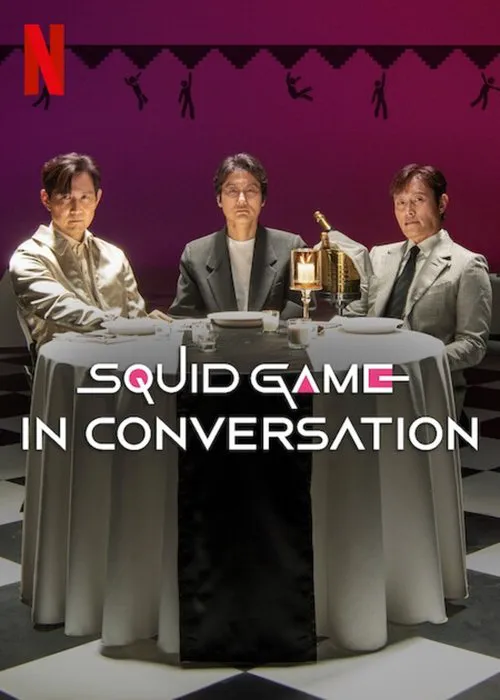Squid Game in Conversation

Plot
The camera pans across a bustling film set, the sound of murmuring crowds and clinking equipment filling the air. We're about to embark on a behind-the-scenes journey with the director and cast of the critically acclaimed Netflix series Squid Game. As we take a seat with those who brought this chilling world to life, the intricacies of their process and the emotions that drove them come to the forefront. Squid Game, the brainchild of screenwriter and director Hwang Dong-hyuk, was born from a desire to explore the darker aspects of human nature. A childhood game, which in reality would leave no one alive, became the foundation for a dystopian narrative that delves into social commentary on class struggle, inequality, and the effects of toxic societal pressure. The series follows a group of individuals from all walks of life, all bearing their own scars and insecurities, as they're forced to participate in a series of deadly children's games to pay off their insurmountable debt. As we sit down with Hwang Dong-hyuk, the man behind the game, he recounts the origin story of Squid Game. "Growing up, I was always fascinated by games," he begins. "The way people would come together, united in their desire to win, but with a hint of cruelty beneath the surface." The parallels between these innocent games and the brutal world of modern-day society were too great to ignore, Hwang believed. And so, he began crafting a narrative that would peel back the façade, exposing the cruel underbelly of a society that values survival above empathy. We're joined by the cast, who share their own reflections on their characters and the process of bringing Hwang's vision to life. Lee Jung-jae, the charismatic lead actor, talks about the complexities of Ki-hoon Seong, "a charismatic and intelligent individual struggling to maintain his dignity in a world where he's been reduced to nothing." Through Lee's portrayal, we witness the vulnerability and fear that lies beneath Ki-hoon's charming exterior, as he navigates the treacherous landscape of the game. Park Hae-soo, who brings the enigmatic Cho Sang-woo to life, speaks about the character's evolution throughout the season. "Cho's transformation is a result of his desperation," Park notes. "A man so consumed by his own darkness that he can no longer distinguish right from wrong." The dynamic between Sang-woo and Seong, as they navigate the game and their own complicated past, is a compelling aspect of the series. Through their contrasting characters, the show highlights the human cost of the system's brutal efficiency. The cast also delves into the grueling training process, which pushed them to their physical and emotional limits. "We trained for hours every day," actor Anupam Tripathi recounts, speaking about his character, Abdi. "We wanted to get it just right, to convey the desperation that drove our characters to fight for survival." The dedication to their craft is evident in their performances, each one imbued with a raw, unbridled intensity. Behind every camera angle, every perfectly choreographed death scene, and every agonizing twist, lies a wealth of emotional labor. As we sit with the cast and crew, we begin to understand the personal stakes that drove their creative vision. They discuss the toll it took on their mental health, the weight of responsibility, and the delicate balance between conveying the horrors of the game and maintaining sensitivity to the real-life struggles of the characters. The result is a narrative that walks a fine line between social commentary and entertainment. Squid Game is a testament to the power of storytelling to confront and critique the darkest aspects of our society. In sitting with the director and cast, we gain a deeper appreciation for the intricate web of emotions, personal stories, and social commentary that underpin this captivating series. As our conversation comes to a close, we're left with the haunting question posed by the Squid Game: what would you do when pushed to your limits, when survival is the only currency that matters? Would you sacrifice your dignity, your humanity, or even your life to emerge victorious, or would you succumb to the crushing weight of societal expectations? In the end, it's not just a game; it's a reflection of our own desperate struggle to stay human in a world that values nothing but our existence.
Reviews
Recommendations



